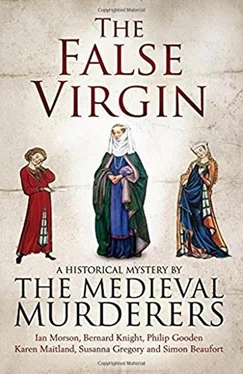Shakespeare makes a number of allusions to Glyndwr’s mystical nature in his play Henry the Fourth, Part I and it is known that he relied considerably on portents and prophesies delivered by his soothsayer, Crach Ffinant.
Blidworth, Nottinghamshire, December 1541
‘I call it theft!’ Richard Whitney’s heavy jowls quivered in outrage.
The butcher reminded Father James of an indignant cockerel and the sight would have struck the priest as comical had he not been so insulted by Richard’s accusation.
‘You should not have left the candle here in the first place,’ Father James retorted. ‘You know full well that Thomas Cromwell has forbidden the lighting of candles to any saints, and especially the placing of them before their relics. I know some of the old and ignorant in the parish have trouble understanding why they can no longer bring offerings to the saints as they have done all their lives, but as Master of the Butchers’ Guild you should set an example for them.’
Richard Whitney took a step closer, thrusting his florid face close to the priest’s. ‘Do I look like a man who’d waste his hard-earned money on church candles? It was my frog-witted apprentice who left it here. That boy’s so pious he’d make St Peter look like a non-believer. The lad’s a fool, and I gave him a good thrashing when I heard what he’d done. But the point is, he spent good money for that candle and it wasn’t his to spend. Alan bought that great candle with the purse his father gave him to pay his apprentice fees to me. Now it’s been stolen.’
‘I hope you’re not suggesting I took it,’ Father James said, with as much dignity as he could muster.
But the priest was a head shorter than his parishioner, and though not easily intimidated he found himself distinctly uncomfortable at the man’s close proximity. Besides, Master Richard consumed far too much of his own meat and his breath always stank. Father James took a few paces up the steps of the chantry chapel so that he had the advantage of height, but that only seemed to antagonise the butcher.
‘Don’t you dare walk away from me, Vicar! I haven’t finished with you. Alan says there was more than two pounds of wax in that candle, not to mention the worth of making it. That candlemaker makes an even fatter profit from the gullible than the Church does. So if that candle’s going to be lighting anyone’s table this winter, it’ll be mine.’
Father James’s chin jerked up. ‘The candle belongs to this church. It’s been offered to God in faith. Even if we should find it, you certainly can’t use it to entertain your friends.’
Richard snorted. ‘According to Cromwell, God doesn’t want it, and it’s my money that was squandered on buying it, so I’ll be getting the worth of it, not you or your churchwarden. Mark my words, he’s the thieving bastard who’s taken it. So you can tell Yarrow I want it back by nightfall, or I’ll be round his house to fetch it myself, and you can be sure I’ll make him regret putting me to that trouble.’
Master Whitney turned on his heel and marched from the church, slamming the heavy door behind him with such force it set the wooden cradle in the corner of the church rocking. The cradle was only used at Candlemas, when a baby boy, born closest to Christmas Day, would be rocked in it in honour of the Feast of the Purification of the Virgin. It was an honour the families often came to blows over, for it was said to bestow great good fortune on the child, but Father James found himself wondering if this too would soon be forbidden by one of Thomas Cromwell’s numerous injunctions.
The priest had been trying to hold himself so tall, it was only now that he realised his back was aching from the effort. He shuffled a few paces to the carved stone rail that separated the faithful from the chantry altar and leaned heavily upon it, sighing.
If it was the churchwarden who’d removed the candle, it certainly hadn’t been placed with the ones in the chest destined for the main altar, as it should have been. And this wasn’t the first time offerings to St Beornwyn had gone missing over the past months. Many candles and tawdries laid at her feet had vanished without trace, even a costly ring given by a woman grateful for the life of her sick child.
Thankfully, the villagers of Blidworth had asked no questions. Assuming that their forbidden offerings had been hidden safely away in the church chest, they had not dreamed of asking for their return. But a man like Richard was never going to accept such a loss quietly. Not that the butcher could report the theft, for if he did so it would come to light that young Alan had left the illicit offering in the church, and a master could be held responsible for the actions of his apprentice. But that made it more likely Richard would mete out his own brand of rough justice. For by now whoever had stolen it would have surely sold it or melted it down to make a dozen household candles. Father James fleetingly wondered if it hadn’t been taken by the candlemaker himself, who could then resell it to some other fool. He, above all in the village, would know the worth of it.
The priest glanced over at the source of all the trouble, the gilded reliquary in the form of the statue of the saint, which stood on the altar of the chantry chapel. St Beornwyn had been carved holding out her left hand on which rested a sumptuously jewelled and enamelled butterfly, the size of a raven in proportion to the height of the woman. Her painted robe was torn away on the top half of her body to reveal naked breasts, only partly covered by her right hand. Embedded in the back of this hand was a polished fragment of rock crystal beneath which lay a strip of the saint’s own skin, flayed from her body when she was martyred. Two more pieces of crystal set into her bare feet encased two more fragments of skin. Not for the first time, Father James found himself entertaining the less than spiritual thought that if the saint had been half as voluptuous in life as her carving, then it was a miracle she had remained a virgin at all.
But why had that wretched boy taken it into his head to spend his apprentice fees on a candle? Was he praying St Beornwyn would rescue him from his apprenticeship? Father James could hardly blame Alan if he had. Richard had a notoriously short temper and the whole village knew he bullied his lads. It was even rumoured that a few years back, one of his apprentices was so miserable he had gone into Sherwood Forest and hanged himself, though the Butchers’ Guild blamed it on lovesickness for a girl who spurned him.
But the priest was certain that Alan would never commit such a sin, however badly Richard used him. In fact, the boy almost seemed to revel in his ill-treatment as if it was a test of his faith and devotion to St Beornwyn. On numerous occasions both Father James and the churchwarden had each been forced to drag the boy away from the chantry, reminding him sternly that praying before relics was now forbidden.
The boy made no secret of the fact that he had wanted to become a monk, but with the monasteries being closed and the monks forced out into the world, there was no chance of that. Even entering the priesthood was no longer a safe choice. Little wonder then that Alan’s parents had decided that in this fast-changing world only one thing was certain – people would always need butchers.
Father James glanced over his shoulder to ensure he was alone, then, crossing himself, he kneeled and muttered a hasty prayer that the blessed St Beornwyn would keep Richard’s hand from the churchwarden’s throat and Cromwell’s enforcers far away from Blidworth.
Master Richard Whitney’s temper had not improved one jot since he stormed from the church and was, if anything, made worse when he flung open the door of his house and heard his wife’s laughter ringing from the small chamber beyond the oak-panelled hall. He didn’t usually return home in the afternoon, so could not reasonably expect his wife, Mary, to be waiting for him with the table laid ready with his supper. But Richard had never been an entirely reasonable man and was becoming less so with every passing year, especially since he had become Guild Master, an honour that was usually granted to the butchers who lived in the large towns, such as Nottingham.
Читать дальше












